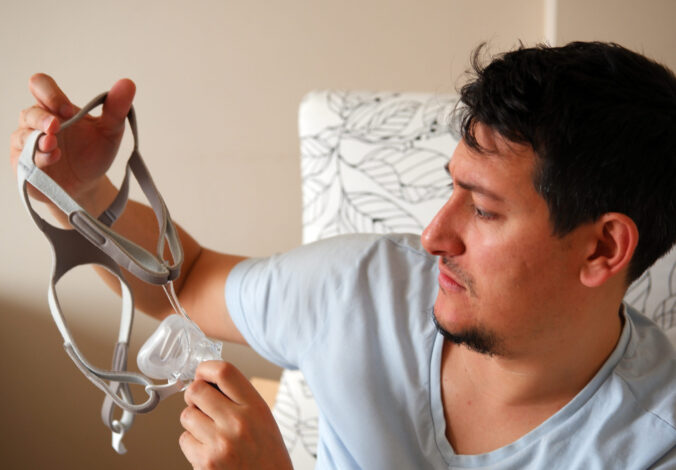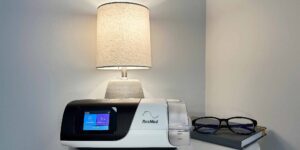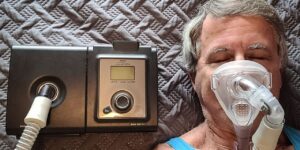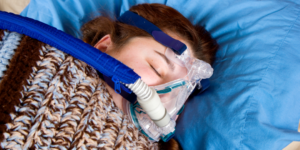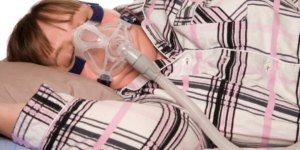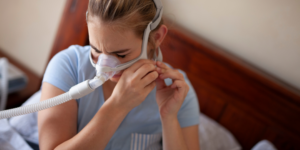Sleep apnea is a potentially severe medical condition that may result in heart problems if ignored. It is crucial to make an appointment with your doctor as soon as possible. You’ll need their expert advice and a special treatment plan designed to deal with your specific sleep issues. Continue reading if you’re looking for lifestyle changes and all-natural sleep apnea treatments.
What is sleep apnea?
Sleep apnea is a medical disease that causes brief breathing pauses while you’re sleeping. This condition may prevent you from getting enough oxygen, which might cause you to gasp for air and awaken. You may or may not remember these sleep disturbances in the morning. Fatigue, loud snoring, headaches when you wake up, a dry mouth or sore throat, trouble concentrating, shortness of breath when you wake up, and daytime drowsiness are common sleep apnea symptoms.
If you have sleep apnea but don’t know it because you think your sleep cycle is still regular, you may not be conscious of all the breathing pauses. Sleep apnea and loud snoring could sound similar.

How to Spot People with Sleep Apnea
The risk of metabolic and cardiovascular illness is closely correlated with untreated sleep apnea in particular.
These are the two primary types of sleep apnea:
Having trouble sleeping (OSA)
The most common kind of sleep apnea, obstructive sleep apnea, happens when the tongue blocks the airway at the back of the throat.
Snoring in the neck (CSA)
A less common kind of sleep apnea called central sleep apnea occurs when your brain is unable to effectively connect with your breathing muscles.
Treatments for sleep apnea and lifestyle adjustments
As you may be aware, utilizing a CPAP machine, often known as “continuous positive airway pressure,” is the conventional course of treatment for sleep apnea. A CPAP machine is often quite effective, although some people find it uncomfortable.
You may be able to treat your sleep apnea by making lifestyle changes, using your CPAP, and following this health advice. The following techniques may be used to improve sleeping patterns or even cure sleep disorders:

Keep a healthy weight.
Doctors often suggest starting a weight loss program for their obese sleep apnea patients. Your risk of gaining weight may increase if your airways are blocked, especially in your upper body. Any reduction in windpipe pressure may alleviate sleep apnea symptoms.
Those who are obese and lose only a small bit of weight may no longer need upper airway surgery or prolonged CPAP therapy, according to studies.
Cut down on nasal sneezing
Treating sinus or congestion problems may help you snore less and open up your airways, allowing you to get a better night’s sleep.
A few natural remedies include using a sinus spray or saline solution in a Neti pot to cleanse your nose, staying hydrated by consuming plenty of fluids, and avoiding foods like dairy products that could exacerbate congestion.
Make a different sleeping posture
Sleeping on your side as opposed to your back may significantly lessen the symptoms of sleep apnea, even if it may seem like a little alteration. A 2006 study found that sleep position affected more than 50% of obstructive sleep apnea patients. 3 Other studies suggest that laying on your back may make your issues worse. Some folks discovered that their breathing would return to normal if they could sleep on their side. ⁴
Don’t take sedatives.
To find out how taking sedatives or consuming alcohol may influence your sleep apnea, speak with your doctor. Breathing may be made more challenging by anything that relaxes the throat muscles. Benzodiazepines, antihistamines, opiates, or sleeping pills, for instance.

Workout
Exercise often leads to weight loss, which may lower the severity of sleep apnea.
It may also enhance the quantity of sleep and reduce daily fatigue while boosting oxygen circulation.
Use a humidifier
Humidifiers increase the humidity in the air. Dry air may aggravate your body and respiratory system. You will gain from using a humidifier in the following ways:
- Encourage simpler breathing
- Lessen clogging
You could want to add some essential oils, like peppermint, lavender, or eucalyptus oil, to your humidifiers for added benefit.
Last but not least, follow the humidifier’s manufacturer’s cleaning instructions to stop bacteria or mold formation.
Utilize oral devices
Although behavioral changes and CPAP are often the initial treatments used, other resources are also available. In the case of treating sleep apnea, the American Academy of Dental Sleep Medicine recommends mouth appliances.
The ADA asserts that a specially designed device may aid in regaining attention, enhancing sleep, and enhancing health.
These individualized therapies, which function similarly to mouthguards, help to straighten the jaw and move the tongue and soft palate forward to relieve neck congestion.
Oral appliances may vary from low-cost over-the-counter (OTC) choices to custom ones that your dentist creates.
Other guidance
Keep your head held high: Use a cervical cushion or a foam wedge to lift your body several inches above your waist or to raise the head of your bed.
Stop smoking: Smoking increases the likelihood of swelling and inflammation in your upper airway and throat, which worsens sleep apnea. OSA is more common in smokers than in non-smokers.
Avoid consuming caffeinated beverages a few hours before going to bed.
When should you visit a doctor?
Visit a doctor if you notice any of the following symptoms:
- Prolonged loud snoring; excessive daytime sleepiness; headaches or sore throat in the morning
- Snoring, gasping sounds, or shortness of breath upon awakening.
- Insomnia (difficulty falling or staying asleep).
If you believe you are showing sleep apnea symptoms, your doctor might recommend that you consult a sleep specialist. When a sleep specialist completes specialized training and passes an exam, the American Board of Sleep Medicine certifies them.
The majority of sleep specialists concentrate on just one problem, like sleep apnea. Additionally, some of them might be ENT (ear, nose, and throat) specialists.
Conclusion
The signs of sleep apnea may be controlled and lessened with the help of natural remedies and certain lifestyle changes. CPAP therapy is the most widely used and effective treatment for moderate to severe sleep apnea, so you shouldn’t rule it out. Surgery may be required occasionally.
Consult with your doctor before using any natural remedies or home remedies. While some people adjust to using a CPAP machine while they sleep fairly well, others have trouble.
If your doctor recommends CPAP therapy, they will look for the mask, machine, and pressure settings that will make you feel the most comfortable. Visit a doctor as soon as your symptoms start to get worse.

